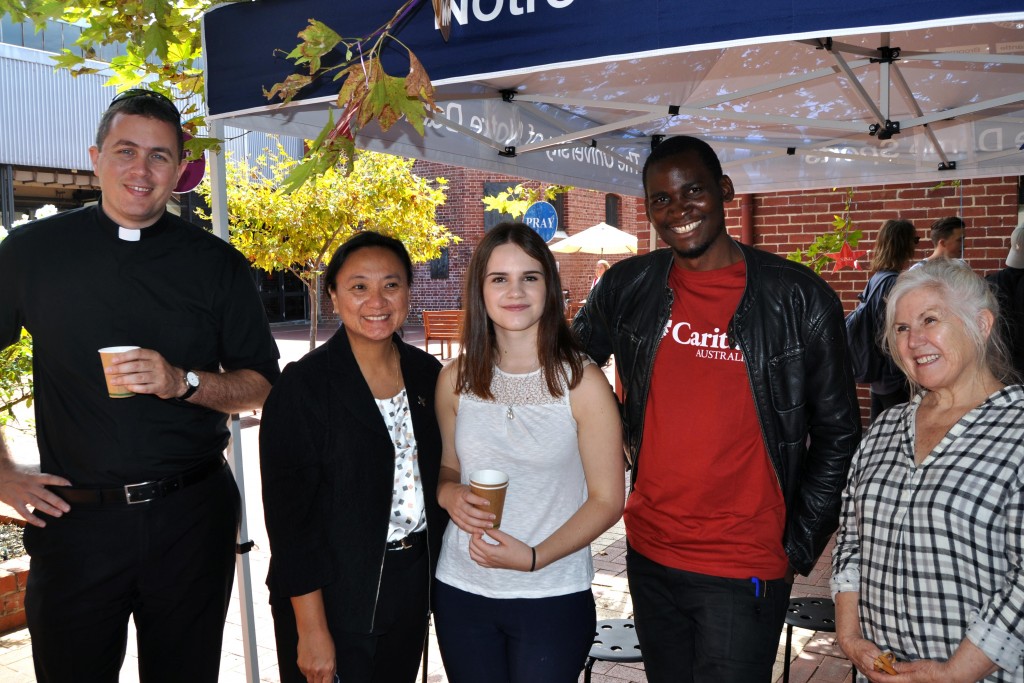
Empowering people to make use of their own resources to drive change in their communities underpinned Martin Mazinga’s dialogue with guests during the launch of Project Compassion 2016 at The University of Notre Dame Australia’s Fremantle Campus on Tuesday 23 February 2016.
This year’s Project Compassion theme Learning More, Creating Change celebrates 50 years of Caritas Australia’s work in bringing the power of education, training and shared knowledge to empower vulnerable communities to realise their hopes for peace, equality, dignity and justice.
One of the stories highlighted during the Project Compassion appeal comes from Malawi, one of the world’s least-developed countries. Martin Mazinga, the National Programmes Coordinator of the Catholic Development Commission in Malawi (CADECOM), has been visiting schools and parishes across Perth and WA, as well as the University of Notre Dame in Fremantle.
Mr Mazinga spoke openly about the work being undertaken in the land-locked African nation to improve literacy rates, tackle inequality, and empower people to earn an income and be self-sustaining.
Through a closer recognition of the physical and spiritual values in his people, Mr Mazinga hopes to further establish an aspirational mindset where communities take ownership and drive the development agenda.
“The historical cycle of a needs-based approach to reform is fundamentally incorrect and disregards the aspects of what makes a community functional,” Mr Mazinga said.
“Development needs to be by the people for the people. Together, we can build the capacity of the community to be self-sustaining, and ensure that education and food security continue to be high priorities.
“It is through this passion for social justice that we can empower communities to make a difference to their people.”
Working at the grassroots
With a focus on food security and water supply, CADECOM tackles inequality at its roots for the most marginalised communities, empowering people to develop livelihoods, earn an income, learn new skills and access education.
With its mainly rural and an economy almost totally based on agriculture, Malawi has some of the poorest communities in the world, Communities face poverty isolation and food shortages are an annual event.
Through Caritas Australia’s partnership with CADECOM, Mr Mazinga works with communities to harness their unique strengths, skills and natural resources and to realise their visions of a just and equal world. This is known as the strengths-based approach.
“The whole notion of the strengths-based approach is that it’s sustainable and brings ownership from communities themselves,” Mr Mazinga said.
“The beauty is that the program, which is funded by DFAT and Caritas Australia, looks at the assets communities have and the communities are the drivers of their own change by mapping their own visions for the future.”
Doney’s story of change
Doney is a mother from Malawi who now has hope for the future. This is thanks to her involvement in Caritas programs which map an individual and community’s assets, education and training,
Today education has brought Doney new skills and new stature and influence in her community. She’s now teaching literacy and numeracy to adults in her village.
“In the past the people I’ve been teaching didn’t know how to read and write,” Doney says. “They didn’t even know the direction the bus was going as they didn’t know how to read the signpost. Now many are able to read and write.”
“I encourage my children to attain education so that they can be independent in the future,” she says. “This would make me proud.”
Mr Mazinga said there are many other examples of the strengths-based approach in Malawi that encourage people to diversify their income opportunities and in this way they can prepare and realise their dreams for the future.
“For instance those who’ve been participating in village savings and loans schemes which have been set up with the advice of CADECOM have been made to think of buying livestock,” Mr Mazinga said.
“When a household has livestock, what it means is that in case they want to pay for medical bills for example or they are running short of food, if the person has livestock, the person has buying power.
“This buying power supports them in case of a livelihood shock, for instance, if a disaster strikes, they are able to sell livestock. Or if one of the family members gets sick they are able to afford their medical bills, in any case of food insecurity they can sell some of their livestock.
In light of Project Compassion’s 50th anniversary celebration this year, Perth-based Caritas Diocesan Coordinator, Sister Janet Palafox expressed how grateful she was to all those who have been supporting Caritas over so many years.
“Every year since 1965, the Catholic Caritas family across Australia and within Western Australia have supported the six-week Lenten appeal in an extraordinary demonstration of faith, love, generosity and compassion,” Sister Palafox said.
Year round, Caritas Australia’s team works with their dedicated partners, inspiring program participants, and compassionate supporters to end poverty, promote justice and uphold dignity.
Every year, Caritas Australia staff and international partners take time to visit Australian schools and parishes to share their experiences with the people who make our work possible.
During Lent, Australians are invited support Project Compassion by direct donation, or by holding fundraising events. To donate to Project Compassion, or for fundraising ideas go to www.caritas.org.au/projectcompassion or phone 1800 024 413.